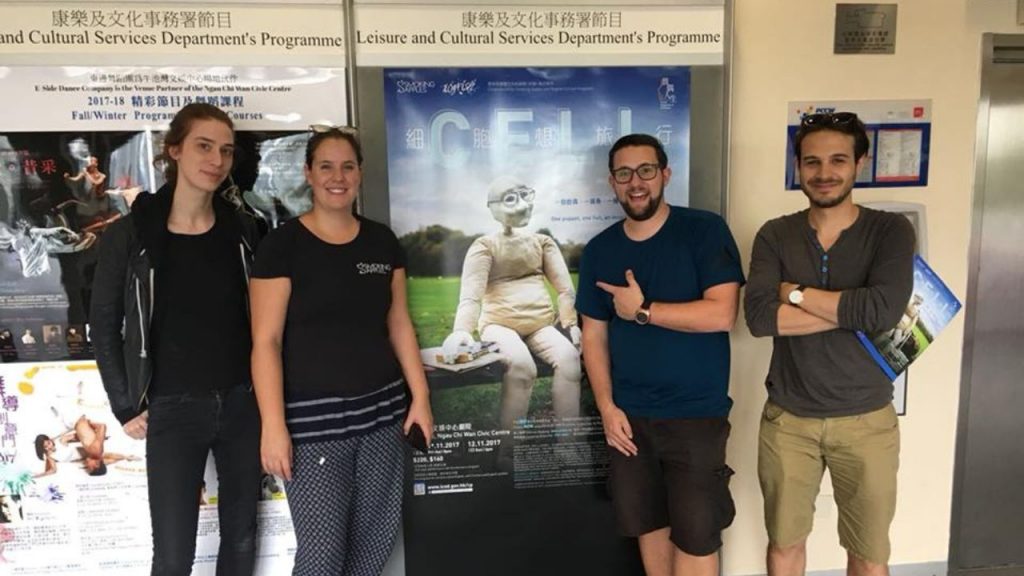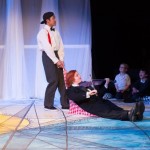After being diagnosed with Motor Neurone Disease, Ted goes on the trip of a lifetime… and so does his pet fish. Humorous, heart-warming and uplifting, CELL features charming puppetry, physical theatre and an original musical score to tell the story of one man’s final adventure.
https://smokingapplestheatre.com/show/cell/
Nominated for a Peter Brook Awards 2014, CELL is the outcome of a new collaboration between two of the most exciting young companies in the UK. The production was initially created as a collaboration between Smoking Apples and Little Cauliflower. In 2015, Dogfish Theatre replaced Little Cauliflower as a producing partner.

The message of the play is that people live with MND rather than simply die from it. I hope Smoking Apples and Little Cauliflower Theatre have a chance to fully develop the living which their central character does with the condition. At the Little Angel Theatre.
Little Angel’s Hatch 2013 Festival is a showcase of work-in-progress performances by new and established puppetry performers and companies. The two companies in the mini-festival I viewed were Smoking Apples and Little Cauliflower Theatre, who combine to stage CELL, the story of a man who goes from being diagnosed with Motor Neuron Disease to becoming wheelchair-bound. Like the most famous MND sufferer, Stephen Hawking, he comes to rely on a computer-generated voice. That voice is effectively the narrator of the show.
The production is an apt subject for a drama using the art of hand-held puppets. The distinction between the human movement seen in the energy and craft of the puppeteers makes each movement by the puppet seem extraordinary. The contrast seems even sharper as I watch the characterisation of a man incrementally becoming less able to move. I note the beautifully contracted puppet as a fitting representation of “everyman”.
Awareness-raising theatre can easily deteriorate into didacticism. Thankfully in CELL the talent and intelligence of co-creators Matthew Lloyd, Molly Freeman, William Aubrey-Jones and Carly Mc Connell avoids the problem. This is mostly because they focus on imaginatively solving how the central character of their drama comes to live with MND. Again, this too might have succumbed to banality except that in choosing to show the quirkiness of a lone man living with his goldfish, the audience is able to watch everyday things slightly off-centre. Turning the life of the goldfish into a metaphor itself, the audience uneasily comes to understand the limits of experience on all of us.
The arrangement of the story shows the man living between his hobby of trainspotting, his home with the goldfish and his dealings with doctors and hospitals. This is effectively done with probing beams of light and the use of shadow puppetry upstage. Then comes a voyage on the Eurostar which takes the narrative to another level. The use of music and lighting is strongly suggestive of a man eking all that he can out of life.
This is not to say that this isn’t a work-in-progress: there’s more to be done on building the narrative and characterising the central figure and other roles in the drama. In particular, I believe that there’s more to be done in showing the progression of MND. The differentiation from first diagnosis to wheelchair seemed to me seemed still too generalised. If anything, like the computerised voice, the final grip of MND seems too uncontested.
Similarly, the events in and between the three locations which the character visits on his Eurostar journey seems very static and time-filling instead of revealing why the character chose to go on the voyage: was it a quest or just a holiday? Its purpose wasn’t clear and only a vague causality is implied between “living with MND” and “going abroad”. Nor does the drama seem to take into account that mobility is so much riskier when not in your usual habitat: why wasn’t this the case for central character in CELL?
I appreciate from the notes written online in the production’s rehearsal journal that the development of the second puppet is still very embryonic, but again dealing with essential motivation did not seem present. It took me some time to understand that the second character was not just another man who was meant to be a “healthy” body, reflecting back to the central figure his desire to be well again.
Nonetheless, this is potentially a very engaging and worthwhile drama of a life embraced by the challenged with motor neurone disease. The final message of the play emphasises that the best course of action is to see yourself living with MND rather than dying from it. If that is the case, then I hope Smoking Apples and Little Cauliflower Theatre have a chance to further develop the living which their central character does with the condition.
Date reviewed: Saturday 7th September 2013






